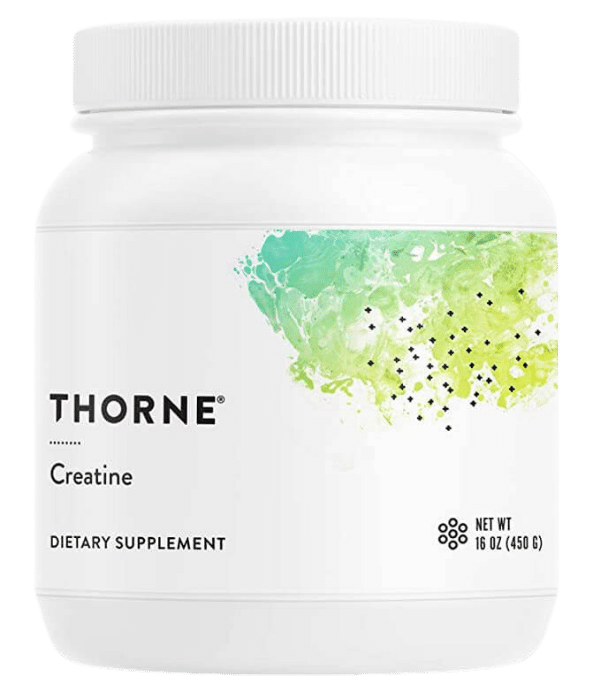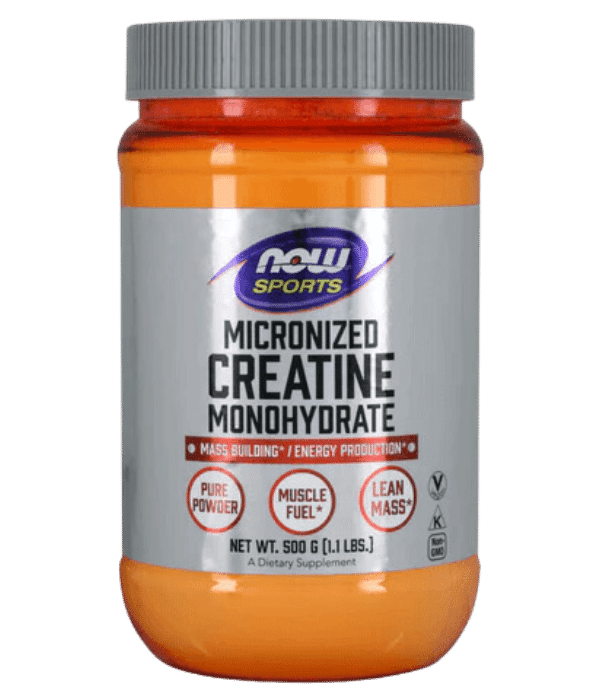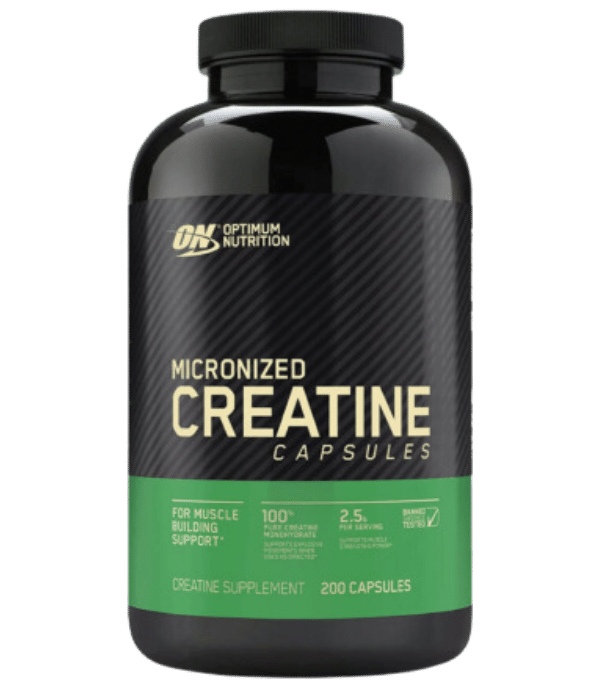Talk to a Registered Dietitian and use INSIDER20 for 20% off!
Talk to a real Dietitian for only $99: Schedule Now
This post contains links through which we may earn a small commission should you make a purchase from a brand. This in no way affects our ability to objectively critique the products and brands we review.
Evidence Based Research To fulfill our commitment to bringing our audience accurate and insightful content, our expert writers and medical reviewers rely on carefully curated research.
Read Our Editorial Policy
Despite extensive creatine usage amongst males and the bodybuilding crowd—which is notoriously lacking in the XX chromosome—evidence and recommendations for creatine use in females is understudied.
Ignoring the bro-focused packaging and masculine messaging, women can seriously benefit from creatine supplementation (no, it won’t make you bulky!), including metabolic, hormonal, and cognitive effects.
If you want to reap the rewards of building lean body mass—which goes far beyond simply looking good—check out our top five options for the best creatine for women, starting with our number one pick, Thorne Creatine Monohydrate.
Best Overall | Budget Value | Most Convenient | |
|---|---|---|---|
| Product | Thorne | NOW Sports | Optimum Nutrition |
| Dose | 5g | 4.2g | 2.5g |
| Cost* | $40.00 for 90 servings ($0.44/serving) Shop Now | $35.99 for 119 servings ($0.30/serving) Shop Now | $76.99 for 100 servings ($0.77/serving) Shop Now |
Best for: Women wanting a top-rated, quadruple-tested, clean creatine powder with no additives.
With over 5,300 five-star reviews, it comes as no surprise that Thorne Creatine Monohydrate is our top pick.
Although there is just one ingredient in this supplement—creatine monohydrate—Thorne ensures it’s of top-quality with four rounds of testing to screen for contaminants and confirm its potency, stability, and purity.
Plus, this creatine supplement is NSF Certified for Sport, which verifies that their products do not contain unsafe levels of contaminants, prohibited substances, or masking agents.
Lastly, this creatine is completely flavorless, which is a bonus compared to the sour-salty flavor of some other amino acid powders.
Best for: Women wanting clean creatine powder for a good value.
At just 30 cents per serving, the NOW Sports Micronized Creatine Monohydrate is an excellent single-ingredient creatine supplement for women on a budget.
Plus, this supplement uses micronized creatine, which uses smaller particles that are both easier to absorb and mix.
NOW Sports products also boast an Informed-Sport seal, assuring that the product has been tested for banned substances.
Best for: Women who don’t want to mix creatine powder; good for lower doses.
For those who aren’t fans of mixing up powder and chugging before a workout, the Optimum Nutrition Micronized Creatine Capsules are the perfect fit.
These capsules are also great for bringing with you when traveling or keeping at the office for that post-work gym sesh.
The dose of creatine (2.5mg per two-capsule serving) in this supplement may be on the lower side for some, but perfect for others who prefer a reduced amount of creatine—plus, being in capsule form makes it easier to double-dose if need be.
However, this creatine is already creeping up the more expensive side—especially if you double-dose with 5mg regularly.
Best for: Women looking for a female-founded clean creatine with feminine packaging.
Steer clear, gym bros; the Alani Nu Creatine Monohydrate supplement is just for the ladies (just kidding—no discrimination here).
But if you’re wanting more feminine branding and packaging, this is the creatine supplement for you—plus, it’s a female-founded brand.
The Alani Nu Creatine Monohydrate contains just one ingredient—creatine monohydrate—with no artificial colors, sweeteners, or anything funky.
Plus, this creatine is tested for banned substances and manufactured in a GMP (Good Manufacturing Practice) compliant facility.
However, this is on the expensive side, at $0.83 per serving (pink tax strikes again!).
Best for: Women wanting a combination formula of creatine and healthy pre-workout.
Although 4 Gauge contains significantly less creatine per serving (1g) than the others on this list, it makes up for it with science-backed ingredients designed to support you both pre- and post-workout.
In addition to creatine, 4 Gauge contains natural vasodilators like L-Citrulline-DL-Malate and red beetroot extract, coconut water powder to boost hydration, and a blend of caffeine, L-theanine, and Rhodiola to support a calm and balanced energy.
Plus, the addition of the amino acid derivative acetyl-L-carnitine is thought to prevent Delayed Onset Muscle Soreness (DOMS) and reduce post-workout fatigue.
Unlike many other pre-workout powders on the market, 4 Gauge doesn’t contain artificial sweeteners, ingredients, or dyes. Although it does have 150mg of caffeine—which may be excessive for some people—the addition of L-theanine can balance out any jitters and provide a calm, focused energy for your workout.
Creatine is a molecule produced in the body from amino acids that plays an essential role in energy production.
Although we naturally produce it after consuming animal foods like red meat and fish, people take supplemental creatine to support muscle mass and strength, power during exercise, recovery, and overall exercise performance.
Creatine turns into creatine phosphate in the body, which helps make energy in the form of adenosine triphosphate (ATP).
Supplementing with creatine can create more creatine phosphate to replenish ATP stores in your muscles—meaning, you can exercise for longer and harder without fatiguing as quickly.
However, taking creatine on its own is not a magic muscle-building bullet—you have to combine it with resistance training to support an increase in lean body mass.
Creatine supplementation has been shown to act as a possible countermeasure to the menopausal related decrease in muscle, bone, and strength….
Researchers from University of North Carolina, Creighton University, and University of Regina
Females may benefit even more from supplemental creatine than males, as women have been found to have lower endogenous creatine stores, consume significantly less dietary creatine, and have altered creatine metabolism during different menstrual cycle stages.
Supplemental creatine has shown muscular benefits in both pre- and post-menopausal women—a life stage commonly associated with declining lean body mass.
As researchers published in the journal Nutrients put it, “Creatine supplementation has been shown to act as a possible countermeasure to the menopausal related decrease in muscle, bone, and strength by reducing inflammation, oxidative stress, and serum markers of bone resorption, while also resulting in a concomitant increase in osteoblast [bone-forming] cell activity.”
Plus, as it’s also found in the brain, creatine has been studied for its potential role in cognitive health, including reducing mental fatigue and possibly improving working memory in older adults.
Creatine monohydrate is the most common supplemental form, containing a creatine molecule and a water molecule (hence the “monohydrate”).
Due to the extensive amount of research on it, creatine monohydrate is often considered the gold standard for creatine supplements.
Because of the water molecule added, creatine monohydrate is known to cause water retention, weight gain, bloating, or minor digestive issues during the beginning stages of taking it supplementally—especially in high doses.
However, creatine-induced weight gain is more prevalent among males—one systematic review found that women who took creatine had no significant impact on weight gain or gastrointestinal-related events.
Creatine hydrochloride is gaining popularity because initial studies in the lab showed superior solubility and fewer digestive side effects compared to creatine monohydrate—but the research has not been replicated in humans.
Another form is creatine magnesium chelate, which has a magnesium molecule attached to the creatine molecule.
One study found that creatine magnesium chelate was similarly effective as creatine monohydrate in improving bench press strength and endurance—but we have limited data on this form.
Lastly, another recently popularized form is creatine alpha-ketoglutarate (creatine-AKG).
As AKG is a vital component of the energy-producing Krebs cycle, it’s thought that this form can help transport creatine into the mitochondria of muscle cells.
Again, this type has not been well-researched.
Women should likely take creatine monohydrate, as it is the most research-backed form of creatine.
Research has shown that women are less likely to be affected by creatine monohydrate’s side effects, including digestive distress or water retention.
Yes, females who resistance train and want help building muscle would likely benefit from taking creatine.
In addition to its benefits on muscle strength and exercise performance, creatine may benefit mood, mental clarity, and cognitive health.
It depends, but a general recommendation would be to take 3-5g of creatine per day.
If you experience digestive side effects, consider taking the lower dose (3g).
Taking more than 5g at a time would likely increase the risk of water retention and weight gain.
“Creatine loading” can cause digestive side effects—this process involves taking higher doses of creatine (20-25g) for 5-7 days, then reducing to a maintenance phase (3-5g) for 3-4 weeks.
The primary side effects that creatine loading causes are nausea, bloating, or diarrhea—especially if creatine is taken without adequate water intake.
While creatine monohydrate is the form most linked to water retention and weight gain, research has found that women are less likely to be affected by adverse events than men.
However, doses of 20-25g are excessive for most women—even in the short term.
Creatine monohydrate may initially cause weight gain due to an increase in water retention.
These increases in weight gain and water retention are typically short-term, resolving a few weeks after the loading phase.
To avoid water retention, you can skip the loading phase and simply start with a maintenance dose of 3-5 grams of creatine per day.
However, some research shows that creatine-induced weight gain is more prevalent among males.
In the long term, creatine can help with weight loss, as it helps to support muscle growth and reduces fat mass in women.
Avgerinos KI, Spyrou N, Bougioukas KI, Kapogiannis D. Effects of creatine supplementation on cognitive function of healthy individuals: A systematic review of randomized controlled trials. Exp Gerontol. 2018;108:166-173. doi:10.1016/j.exger.2018.04.013
Branch JD. Effect of creatine supplementation on body composition and performance: a meta-analysis. Int J Sport Nutr Exerc Metab. 2003;13(2):198-226. doi:10.1123/ijsnem.13.2.198
de Guingand DL, Palmer KR, Snow RJ, Davies-Tuck ML, Ellery SJ. Risk of Adverse Outcomes in Females Taking Oral Creatine Monohydrate: A Systematic Review and Meta-Analysis. Nutrients. 2020;12(6):1780. Published 2020 Jun 15. doi:10.3390/nu12061780
Eckerson JM, Stout JR, Moore GA, Stone NJ, Nishimura K, Tamura K. Effect of two and five days of creatine loading on anaerobic working capacity in women. J Strength Cond Res. 2004;18(1):168-173. doi:10.1519/1533-4287(2004)018<0168:eotafd>2.0.co;2
Gufford BT, Sriraghavan K, Miller NJ, et al. Physicochemical characterization of creatine N-methylguanidinium salts. J Diet Suppl. 2010;7(3):240-252. doi:10.3109/19390211.2010.491507
Kendall KL, Smith AE, Graef JL, et al. Effects of four weeks of high-intensity interval training and creatine supplementation on critical power and anaerobic working capacity in college-aged men. J Strength Cond Res. 2009;23(6):1663-1669. doi:10.1519/JSC.0b013e3181b1fd1f
Santos RV, Bassit RA, Caperuto EC, Costa Rosa LF. The effect of creatine supplementation upon inflammatory and muscle soreness markers after a 30km race. Life Sci. 2004;75(16):1917-1924. doi:10.1016/j.lfs.2003.11.036
Selsby JT, DiSilvestro RA, Devor ST. Mg2+-creatine chelate and a low-dose creatine supplementation regimen improve exercise performance. J Strength Cond Res. 2004;18(2):311-315. doi:10.1519/R-13072.1
Smith-Ryan AE, Cabre HE, Eckerson JM, Candow DG. Creatine Supplementation in Women’s Health: A Lifespan Perspective. Nutrients. 2021;13(3):877. Published 2021 Mar 8. doi:10.3390/nu13030877